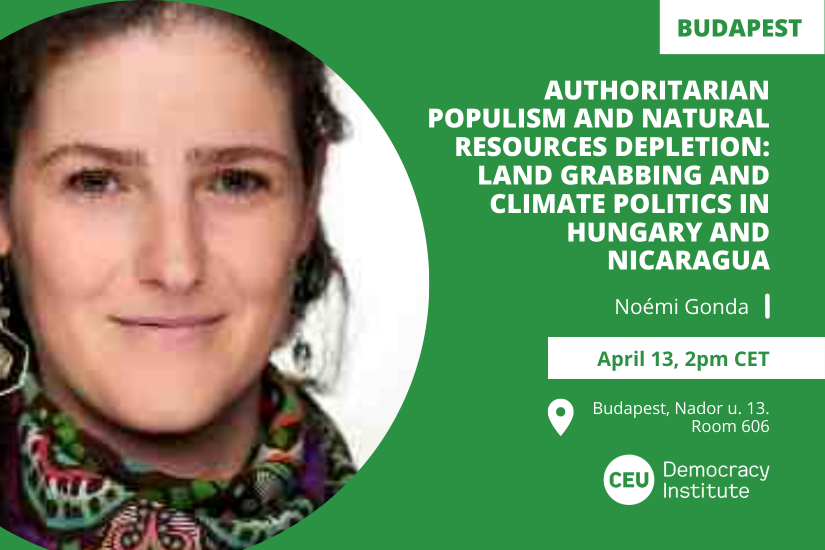
The Environment and Democracy Workgroup of the CEU Democracy Institute cordially invites you to its seminar.
If you would like to attend in-person, please register here.
Please keep in mind that external guests will not be able to enter the building without prior registration.
There is no need to register if you would like to follow the seminar online, via Zoom. The meeting will be available here.
Constructing environmentally sustainable and democratic political regimes constitutes the most important political project of our times – an era characterized by the proliferation of authoritarian populism and the growing effects of climate change. This double challenge requires rethinking environmental governance as part of a broader question of democracy. For this, I explore how land and climate politics in contemporary Hungary and Nicaragua contribute to further existing intersectional exclusions, favor political elites and re-signify climate goals and sustainability in such a way that it favors the regime and its allies. Unmasking the contradictions and ambiguities of environmental governance promoted by authoritarian populist political regimes can help us peer through the cracks of authoritarian populist politics, and contribute to envisioning democracy through environmental governance.
Speaker:
Noémi Gonda is a researcher at the Department of Urban and Rural Development at the Swedish University of Agricultural Sciences (SLU). She has a PhD from Central European University, and her PhD research (2016) was a feminist ethnography which focused on the politics of gender and climate change in Nicaragua. Between 2017 and 2020, she was a post-doctoral researcher on social and ecological justice at the department of Urban and Rural Development under the mentorship of Professor Andrea Nightingale. She is currently doing research on justice and conflict resolution in resource management as well as on the linkages between natural resources management and the development of authoritarian regimes. She has professional experience in rural development mainly in Central America where she has been working between 2002 and 2010 with smallholder farmers, Indigenous groups and international organizations. She is particularly interested in exploring how radical social and environmental transformations towards justice and equity can emerge, and the role of scholar-activists in supporting the emergence of such transformations. She has taught at the Central American University in Managua, Nicaragua and served as a teaching assistant at Central European University, Budapest, Hungary while she was doing her PhD. She has more recently been giving lectures in several Master's programs at Cemus (Uppsala University) and SLU.
Discussant:
Alexios Antypas is a Research Affiliate at the CEU Democracy Institute, and Associate Professor in the CEU Department of Environmental Sciences and Policy. His broad areas of expertise are in environmental policy and global environmental governance. He has served as a consultant to the United Nations Environment Programme, the United Nations Development Programme, the World Health Organization, the European Committee of the Regions and various agencies of the United States government. His specific interests include the international relations of climate change, human rights and the environment, and the relationship between environmental governance and democracy. He is currently developing a project that examines the impacts on democracy of COVID-19 pandemic related policies and the implications for climate change policy.
Chair:
Stephen Stec is Senior Research Fellow at the CEU Democracy Institute leading the Environment and Democracy Workgroup. A lawyer by profession, he teaches courses related to environmental law, governance and security in CEU’s Department of Environmental Sciences and Policy. He taught at Osaka University, Venice International University, and Haida University among others. Stephen took part in the negotiation of multilateral agreements including the Aarhus Convention and the Carpathian Convention. He is also an elected representative of the Scientific and Technological Community Major Group of UNEP. He publishes in the fields of environmental law, governance and human rights; environmental and energy security, nexus assessment, and corporate accountability. He authored/co-authored the Aarhus Convention Implementation Guide and UNEP’s Guide to the Bali Guidelines on Rio Principle 10 and is the lead author of The UNEP We Want, a flagship report commemorating the 50th anniversary of the founding of UNEP.